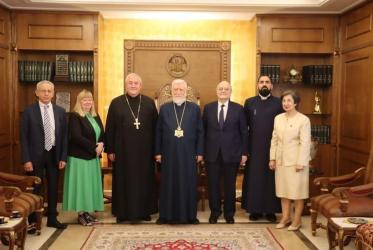Displaying 1 - 20 of 22
06 September 2022
In pictures: Week of Prayer for Christian Unity
01 February 2021
New student body at Bossey Ecumenical Institute “a source of joy”
14 September 2020
Lebanon meeting explores vision for more inclusive global church
07 February 2020
A moment in ‘Time’: an interreligious vision in Erlangen
20 December 2018
Trying to do good for the world
18 December 2017
Coptic Pope and Oriental Patriarchs on historic visit in Germany
25 October 2017
Women in development create space for hope in Egypt
15 June 2017
The child in the manger and the war in Syria
22 December 2016
Strong bridges needed more than ever
21 December 2016











